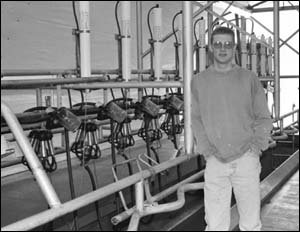This article submitted by Linda Stelling on 3/10/98.
 “I don’t think there is a better place to grow up than on a farm,” Doug Voss, Paynesville, said as he discussed his future.
“I don’t think there is a better place to grow up than on a farm,” Doug Voss, Paynesville, said as he discussed his future.At 22, Doug is in the process of purchasing the building site and about 100 acres of the farm from his dad, Art, 58. Doug will be the third generation farming the land a mile east of Paynesville on Highway 23.
“If a person was looking for easy living and easy money for a way of life, it’s not here with farming,” Doug said. “Farming is changing and it is not family farm orientated anymore. Farming has become more and more a business operation.”
Voss attended Concordia College two years and has the equivalency of an associates degree in music. “I couldn’t justify spending another $14,000 for school when I knew I wouldn’t be using music as a career,” Doug said.
He then came to the decision to farm and attended classes in animal humanities. He attended Ridgewater College-Hutchinson for a year and graduated from the dairy herd management program.
In March of 1997, Doug took over milking the herd after his dad broke his leg. Doug has been doing all the milking since that time.
Doug plans on setting up a seasonal breeding program where all the cows will freshen in either the spring or fall. “I need a certain number of cows to start with. At present, I’m milking 60 cows,” Doug added.
Doug wants to be able to utilize the facilities and land better. His program has certain windows which need to be worked through to reach his long-range goal, a more efficient dairy herd. He also intends to use intensive rotational grazing which is making a comeback. For many years farmers did not believe in grazing their cattle in pastures. Voss plans on developing grassed paddocks in which the herd can graze.
The first stage of his short-term goal was to survive with a smaller milking herd and gradually build the herd to between 120 and 150 cows. “I need to make the first stage work before moving onto another stage,” he emphasized.
As part of this plan, they remodeled the barn last fall and built a New Zealand swing style milking parlor. “The parlor is the first of its kind in the state,” Doug said. “It is being used on a trial basis. Before it could be built, the Department of Health inspected the farm, as well as First District Association field-man, state inspectors, bankers, and representatives who provided the equipment.
Midwest Building and Fencing and Cover-All Shelter were the companies from whom he purchased the non-conventional system. “It costs about a third of a conventional facility,” Doug added.
The building which houses the New Zealand parlor measures 22 by 60 and is constructed of plastic canvas. The canvas consists of three layers inside a white liner (insulation and foam wrapped in foil). It is attached to the south end of the old barn.
The end of the barn was revamped to accommodate the new structure. The stanchions and the gutter in the barn were eliminated. The old portion of the barn is now considered the holding area for the cows waiting to be milked. Instead of a gutter, plastic PVC pipe was installed which drains underground toward the manure pit located to the south of the barn.
“The new hip style structure is draft free and airtight,” Doug said. “Once the milking is done, everything (holding area and milking parlor) is pressure washed.”
The milking parlor is presently designed for 12 cows but can be expanded to milk 15 at a time. The parlor holds 30 cows total. “By the time I get all the milkers on down the line, I can swing the milkers over to the other side and start all over again,” Doug said. To milk 60 cows takes Doug 45 minutes. He milks twice a day, 3 a.m. and 3 p.m. After the 3 a.m. milking, he heads back to bed.
Voss plans on treating his herd as a group and doesn’t mix feed rations individually for the cows, it’s more economical, he added.
“What other career can you have where you need to know about being a plumber, veterinarian, electrician, dairyman and crop specialist,” Doug said.
“Farming is a good way to preserve nature and practice conservation,” Doug added. “It is a good place to get back to the basics.”